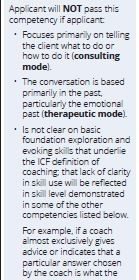Transition is part of life. Children transition from being home to attending school to college to a job. Adults experience transitions in relationships, homes, and careers. During these transitions there are challenges and opportunities. Coaching supports successful transition while maximizing the opportunities.
What does coaching offer that makes such a difference? Let’s consider one example without a coach and then again with a coach:
The transition: After working with a company for 18 years Karla was down-sized. She is struggling to find a new position and wonders if her age is a barrier.
Without a coach: Because she received severance pay, initially Karla takes some down time and gets caught up on projects around the house. Karla writes up a resumé, researches job openings, and sends out several each day. She has yet to hear back on anything. After six months of this, Karla is frustrated, unsure of where to look next, and feeling down.
With a coach: A friend suggests to Karla that she work with a career coach. Karla, at a loss for any other options, makes an appointment. The career coach takes time exploring the type of work Karla wants, asks her questions about her background and experience, discusses different perspectives on a quality resumé, and explores resources for finding opportunities. Through this process Karla develops her focus, rewrites her resumé, and develops a comprehensive strategy for her job search. Within three months she is working again.
During transition, a coach serves to maintain your focus on what you want, explore your options, and effectively strategize so that you achieve positive results.
What kinds of transitions do you think coaching makes easier?



